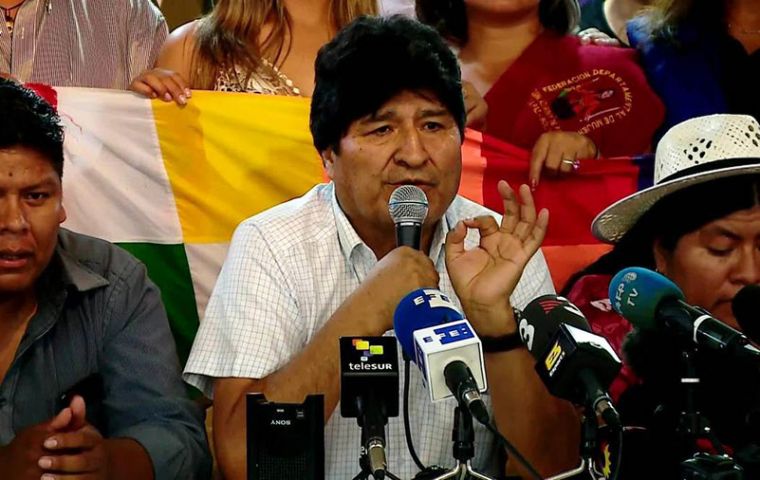MercoPress. South Atlantic News Agency
Bolivian congress finally accepts the resignation of president Evo Morales
 In an at times chaotic debate, the bicameral body dominated by lawmakers from Morales' MAS party formally accepted Morales resignation
In an at times chaotic debate, the bicameral body dominated by lawmakers from Morales' MAS party formally accepted Morales resignation Bolivia's Congress voted on Tuesday to accept the resignation of former president Evo Morales, two months after the 60-year-old quit and fled for asylum in Mexico and then Argentina.
In an at times chaotic debate, the bicameral body dominated by lawmakers from Morales' Movement for Socialism party (MAS) formally accepted his resignation, one day before his original presidential term was due to end.
Wednesday should have been the day when a new president took office but Bolivia was plunged into civil unrest after Morales' controversial re-election in October.
After three weeks of protests, the Organization of American States announced it had found clear evidence of vote-rigging. Morales subsequently resigned on Nov 10 and soon after left the country.
His vice-president, Alvaro Garcia, and the presidents of both the Senate and lower house followed suit, with centre-right opposition senator Jeanine Áñez assuming the presidency as the next highest ranking official in parliament.
Although Morales' resignation constitutionally needed congressional approval, the constitutional court ratified Añez's new post.
She is due to remain president until a general election scheduled for May 3, in which Morales has been barred from standing.
“In the Legislative Assembly we accept the resignation of our colleague Evo Morales and Alvaro Garcia,” influential MAS lawmaker Henry Cabrera told reporters.
“We're fulfilling the constitution which says that the ones who accept or reject resignations are deputies and senators.”
However, deputy Shirley Franco - from Añez's Democrats party - described the vote as “out of date and inadmissible.”
“The constitutional succession took place on Nov 12 due to the definitive absence of the ex-president, who took asylum having left the territory,” she said.
Morales, Bolivia's first indigenous president, had been in power for almost 14 years but twice flouted constitutional term limits to stand for re-election. He has said he wants to return to Bolivia to run MAS' election campaign but an arrest warrant has been issued against him.
The interim government accuses Morales of sedition and terrorism over a telephone recording in which he allegedly urges his supporters to lay siege to major cities.
Morales had repeated several times that until Congress accepted his resignation he would continue to consider himself president.




Top Comments
Disclaimer & comment rulesCommenting for this story is now closed.
If you have a Facebook account, become a fan and comment on our Facebook Page!